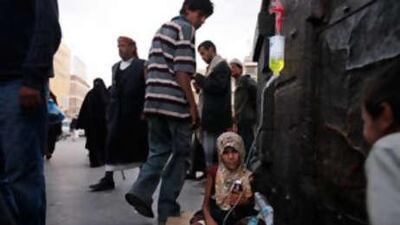NEW YORK // Slow progress on tackling hunger and improving women's rights has left part of the Middle East languishing among the world's worst-performing regions, according to a new report on the UN's anti-poverty targets.
This year's progress report on the UN's Millennium Development Goals (MDGs) describes Western Asia as facing "enormous challenges" in reducing poverty levels and among only three of the 10 regions deemed to be "off-track". While much of the world saw the proportion of those living in extreme poverty drop from 1990 to 2005, Western Asia bucked the trend, with those spending less than US$1.25 (Dh4.60) a day growing from two to six per cent in the same period.
The diverse 14-nation bloc groups together the wealthy Gulf oil-producers with Turkey, Israel, Cyprus and Syria as well as politically volatile countries such as Iraq, Yemen and the Palestinian territories. Equality of the sexes remains the region's main stumbling block, with women occupying a "mere nine per cent" of seats in regional parliaments and only 10 per cent of company management jobs, the report said.
The proportion of women earning cash outside the farming sector increased "very slowly" to 20 per cent between 1990 and 2008 - and an expected increase to 22 per cent by 2015 would still be "well below parity" with other regions. No progress was made on reducing the number of underweight children, which remained level at 14 per cent between 1990 and 2008. Primary school attendance rates have grown slowly, while boys continue to outnumber girls in the classroom.
The proportion of undernourished people rose from five to eight per cent between 1990 and 2002 and only started falling slightly (to seven per cent) between 2005 and 2007, before the food and economic crises struck and likely "slowed or reversed" gains. The 77-page report, released yesterday by the UN secretary general, Ban Ki-moon, said the financial crisis and food price hikes have taken a heavy toll on the region and are the main cause of stalled progress.
Despite the economic crisis, the central MDG target of cutting extreme poverty in half by 2015 globally will likely be met, researchers said, with considerable progress on health, education and disease-eradication already achieved in Asia and Africa. Other parts of the Arab world have fared substantially better than Western Asia, with the countries of North Africa, from Egypt to Morocco, having already met some targets and being "well on track" to achieving others.
UN officials met with Prince Talal Bin Abdul Aziz, the president of the Riyadh-based Arab Gulf Development Program (Agfund), earlier this month to discuss finance strategies that boost living conditions for poverty-struck Arabs. This week, the world body appointed Qatar's Sheikha Mozah Bint Nasser to co-chair a panel promoting MDG progress alongside such "eminent personalities" as Bill Gates and the Nobel Peace Prize laureate, Muhammad Yunus.
The UN chief, Mr Ban, said this week's report sent a message to the Group of 20 (G-20) economic powerhouses meeting in Toronto this weekend - describing the global unemployment figure of 211 million as the "highest on record". "It is time to focus on decent work, not only in wealthy nations, but everywhere," Mr Ban said yesterday. "That means common sense investments in green jobs, economic opportunity for women and more help for the biggest workforce in the world: small farmers. Economic recovery can't be sustainable without job recovery."
The document comes ahead of the MDG summit in September, where leaders of more than 100 countries are due to meet in Manhattan for the UN General Assembly and debate the final, five-year push towards slashing poverty levels. World leaders agreed upon the set of eight, 15-year MDG targets for combating hunger, disease, improving school enrolment and child health and expanding access to clean water at the Millennium Summit in September 2000.
@Email:jreinl@thenational.ae


